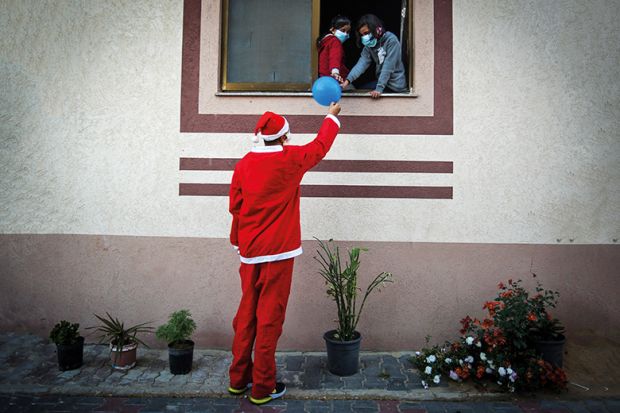The arrival of Christmas always comes as something of a surprise, which it really shouldn’t given its immutable place in the diary.
This year it feels even more premature than usual, after a mild start to winter (in London it has felt like mid-October since, well, mid-October) and the weird sense of stasis Covid has brought to day-to-day life.
So I am blaming my lack of yuletide spirit on the existential threat of climate change, and a global pandemic – one more thing to add to their respective lists of offences.
That sense of time passing, but not in the way we are used to, is one that I suspect all of us have become familiar with over the past two years.
A cycle of hope and gloom was probably inevitable given the waves of infection that have characterised the pandemic, and latterly the push and pull of vaccines and variants.
But it makes the annual job of reviewing the year in higher education difficult, since the arrival of Omicron has blotted out much of the sense of progress of a month or two ago, along with memories of all the developments of the past year that had little or nothing to do with the virus.
In our news pages this week, we revisit many of those stories and developments by suggesting 10 individuals who have, in one way or another, personified the biggest issues of 2021.
Of course, Covid finds its way into that list – how could it not? – in the form of Katalin Karikó, who pioneered the science behind mRNA vaccine technology (but who, for years, could not even get grant funding for her work), and Trish Greenhalgh, who has done a huge amount to improve public understanding of airborne transmission of Covid and how to combat it.
But we also spotlight individuals who have been at the centre of the other big debates of 2021, from free speech on both sides of the Atlantic, to challenging authoritarian regimes, to addressing structural inequality in the form of racism, sexism and the precarity that plagues academic careers.
Focusing on individuals can be a way of representing bigger issues, but one of the lessons Covid has taught us is how connected we all are, for better or worse.
It has been one of the ironies of the pandemic that as our reliance on others was writ large, we were forced to isolate, work from home and socially distance.
For some, the enforced separation will have brought into sharper focus the importance of community, while for others two years of separation may have loosened the ties.
Of course, there are those who dispute the idea that, pandemic or no pandemic, universities still retain their historical collegiality.
In our cover story this week, we ask seven academics from various disciplines and continents whether the idea of the university as a community still holds water.
As ever when we seek multiple points of view, we get them, but a recurring theme is how much of what has been lost resides in the small day-to-day interactions of working shoulder to shoulder with colleagues over time.
Of the contributions, I found the most powerful to be from Joe Moran, professor of English and cultural history at Liverpool John Moores University, who describes brilliantly the complexity that sits behind any glib ideas we might have about community, and what it means in practice.
“Community is not some warm, bland, mushy thing. It is how complicated human beings learn to live alongside other complicated human beings – people who want desperately to be good but who are also self-absorbed, insecure, frustrated and afraid. Community is only ever a work in progress, rife with bugs and glitches. It is hard work.
“That becomes particularly apparent at Christmas, as we try to find it in us to show peace and goodwill to people we find irritating and exhausting. The writer Loudon Wainwright, Jr called Christmas ‘the annual crisis of love’. A university is a permanent crisis of love.”
After a year in which the world and most of us in it have felt in permanent crisis, it may be that the Christmas period offers little respite. But a little is better than none – so happy Christmas, and here’s to easier years ahead.
